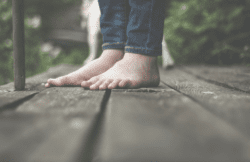AGEING FEET
From the day you started standing and walking, your feet have been keeping you upright. As you grow older, they naturally develop more problems, but painful and uncomfortable feet is not something you should put up with as a lot of the time, the issues can be relieved.
Ageing can cause you to lose fat padding that cushion the bottom of your sole and heels, more often your feet tend to spread as you age and the structure of your feet may change. Carrying extra weight may also contribute to feet issues.
Many conditions such as Diabetes, circulatory diseases and arthritis start in your feet as well. So talk to us today regarding more foot health tips as you age.
CHILDREN’S FEET
Children’s feet differ from adults, as they are not yet fully formed. At six months, the foot is still mostly cartilage. In fact, the last bone doesn’t begin to form until children are about three to four years old. Most bones in the foot are formed by the age of 18.
A child’s foot changes in shape and length with growth. Arch development is an individual thing and the lack of arch height is not always an indication of a problem unless your child has pain, or has only one flat foot that differs from the other foot.
Heel pain is common between the ages of eight to 14 and may be worse during or straight after sport. If your child is experiencing pain at the back of the heel that has limited their activity or causes them to limp, we can help determine whether or not the heel pain is related to the developmental process and give advice about ways to alleviate symptoms.
Footwear and footcare are also very important in growing feet so find out more about how we can help you.
NAIL CONDITIONS
Toenail problems are relatively common in people of all ages. They can become thick, brittle, curved, discoloured, infected, bumpy or grooved. In some cases, the nail falls off and a new one grows. Trauma to the nail bed may cause permanent nail deformity.
- Ingrown nails
Ingrown toenails are common and usually is the cause of improperly trimmed toenails, very curved nails edges, shoe pressure or repeated trauma to the feet from daily activities. Pain in the sulcus (the groove at the side in which the nail sits) can also be caused by a corn or callus under the nail edge. Most cases will require conservative treatment, but some may require minor surgical correction that can be conducted very easily in the clinic.
- Fungal infections
Fungal characteristics consists mainly of thickening, discolouration and separation of the nail from the nail bed. In some cases, the nail may crumble. Left untreated, the nail bed can get infected causing permanent damage and killing the nail.
There are a range of anti-fungal medications available for treatment. Speak to our podiatrist to help you choose the best care and treatment.
PRESCRIPTION ORTHOSES
Foot orthoses are shoe inserts designed to support, align or improve the function of the foot. They are commonly referred to as orthotics. Any age group with a variety of foot conditions require orthoses and most often, people who do a lot of sports and physical activities need orthoses to help their performances as well as biomechanical issues.
Orthoses also help redistribute the pressure in your feet, preventing corn and calluses. It can also help in conditions such as tendonitis, ankle sprains, fractures and post foot surgery postural control.
Find out if orthotics are suitable for you from our podiatrist at Life Ready Physio South Perth for the best management.
HEEL PAIN & PLANTAR FASCIITIS
Heel pain can often be associated with inflammation of the fibrous connective tissue (plantar fascia) running along the bottom of the foot, originating from the heel bone to the ball of the foot. This inflammation is called plantar fasciitis. Left untreated, it can get very painful.
Inflammation of the plantar fascia occurs when it goes under pressure for an extended period, causing it to tear or stretch at points. Symptoms include pain with the first steps in the morning. Over time, stretching can lead to possible growth of a bone spur where it attaches to the heel bone.
This inflammation may also be aggravated by shoes with poor support, especially in the arch area.
Temporary relief can be obtained by resting and stretching.
If you feel you may be experiencing plantar fasciitis, contact our podiatrist Hannah at Life Ready Physio South Perth.




